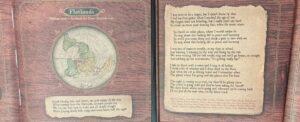Flatlands with lyrics – Zomerfolk
The lyrics to this song are written by our own William for the album Scotland’s Story, we performed it for the first time at our Celtic Folk Night in Wilhemshaven. At the end of all our theatre shows we play this song to get the polonaise going, David & Maceal march through the concert hall and all the audience follows.
Background Info – Flatlands
Scotland the Brave is the bagpipe tune David plays during Flatlands, it is a Scottish patriotic song, one of several often considered an unofficial Scottish national anthem. The tune was first played probably in the late 19th century. The lyrics commonly used now were written about 1950 by Scottish journalist Cliff Hanley for singer Robert Wilson as part of an arrangement by Marion McClurg. “Scotland the Brave” is also the authorised pipe band march of the British Columbia Dragoons of the Canadian Armed Forces
Lyrics “Flatlands”
Good evening lads and lassies, are you happy all the way
We’re coming from the Flatlands, so some people say
We try our very best to make you allright tonight
We’re playing lovely folk songs and some tunes half the night
I was born to be a singer, but I didn’t knew by then
I had my first guitar when I reached the age of ten
My fingers were not bleeding, but I really tried out hard
So come on move your dancing feet, when the music starts
So there’s no other place, where I would rather be
To sing about this fucking life in peace and harmony
So won’t you come along and drink a pint or two with me
To sing about this fucking life in peace and harmony
I was lots of times in trouble, in my days at school
Just learning ‘n turning by the way and living by the ruule
We were waiting ’till the bell would ring and we’d go home, on straight
And picking up our instruments, “it’s getting really late”
I like to dance with women and I sang it all before
I drink a lot of whiskey and I drop dead on the floor
And when the cab is driving home and I remember when
The places where I’m going and the places that I’ve been
The night is coming to an end, but there’ll be plenty more to come
The crowd is going wild and they’ve been asking for “encore”
We don’t know where we’re going and whenever we’re coming back
I’ll see you all the next time, on the latest track

Scotland’s Story is available on CD and Vinyl
Support us at https://rapalje.com/stream
Help David support the cultural sector: https://rapalje.com/donation
Shop for beautiful Rapalje products: https://rapalje.com/shop/
Come and see us in person: https://rapalje.com/agenda/
See the streams at https://www.facebook.com/rapalje
We livestream every tuesday at 20:00 CET, check our agenda for other shows and streams